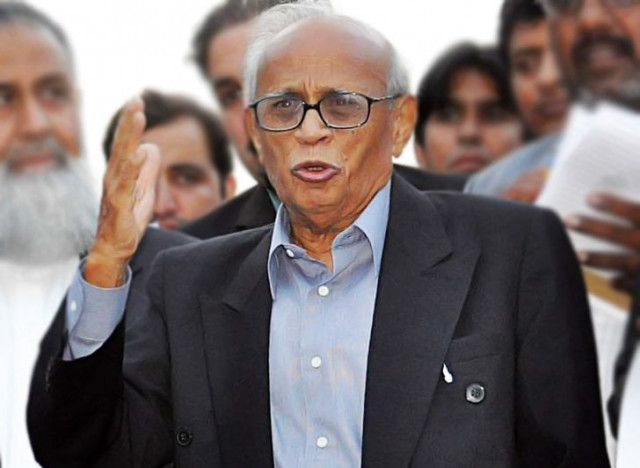South Asia’s first media Ombudsman
Justice (retd) Fakhruddin G Ebrahim was a true pioneer in this respect

Fakhruddin Ebrahim. PHOTO: FILE
When this newspaper was launched in April 2010, it came out with a number of innovative ideas. However, what set the newspaper apart from its contemporaries in almost the entire South Asia was the creation of the office of the Ombudsman. The man who graced this office for nine long years was none other than Justice Ebrahim whose name and address was carried in the last paragraph of the last column of page 17 of The Express Tribune every day until January 7, 2020, when he passed away. An irreparable loss to the country, the nation and this newspaper.
Conceived long ago in the developed world, the office of the media Ombudsman serves as a sort of a court where members of the general public and government are encouraged to take their complaints against cases of violation of good media practices. The media is obliged to redress the grievances of the complainants if so ruled by the Ombudsman by publishing a retraction along with an apology.
The Express Tribune decided to appoint an ombudsman because it believed that social and technological changes have rendered obsolete the age-old gatekeepers that obliged the media to follow a universally accepted code of ethics — strict adherence to accuracy, fairness, consideration for the right of privacy, protection of sources and genuine independence. So, the newspaper thought it advisable to put in place a self-regulating mechanism to enable it to avoid being overwhelmed by irresponsible practices and to also protect the newspaper’s reliability.
Once a final decision was reached to have an Ombudsman’s office of its own, the newspaper looked around for a person of unblemished reputation, impeccable integrity and high level of credibility to hand over this unique responsibility. Justice Ebrahim, one of our national icons, was the automatic choice. When the newspaper approached him, he very graciously accepted the offer. His only precondition was that it would be a totally voluntary arrangement without any financial obligations on the part of the newspaper. This suited the mutual objectives, because this meant the Ombudsman would not be beholden to the newspaper in any manner whatsoever.
The appointment was universally welcomed. Jeffrey Dvorkin, Executive Director of the Organisation of News Ombudsmen, congratulated the newspaper on taking this step, saying, “At a time when many media organisations seem to suffer from a disconnect from their audiences, ombudsmen are a unique demonstration that a media organisation takes its commitment to the public seriously.”
Pakistan Media Watch said, “The appointment comes at a time when the role of the media and media coverage has come under increasing scrutiny and criticism. Following the recent ‘media explosion’ which witnessed the launch of dozens of private media outlets of all mediums, many have complained that media standards, accuracy and accountability have failed to grow with the number of media outlets. The Express Tribune’s appointment of Justice Ebrahim is a welcome example of steps media networks can take to address the dilemma. A highly-respected and neutral outsider can go a long way in putting their coverage in perspective and providing an outlet for readers to address their concerns.”
Zohra Yusuf of HRCP in her piece, “All the News Unfit to Air”, for the newspaper said it has taken a commendable step in appointing Justice (r) Ebrahim as Ombudsman to address complaints. “However, it would have been better if his authority extended over the entire Express media group as there is a greater need for accountability of the Urdu newspaper and channel belonging to the group”.
With Justice Ebrahim no more in the office of the Ombudsman, going through the daily newspaper, the editorial staff would hopefully be making extra efforts to strictly abide by the media’s universally accepted code of ethics.
Published in The Express Tribune, January 11th, 2020.
Like Opinion & Editorial on Facebook, follow @ETOpEd on Twitter to receive all updates on all our daily pieces.



1724319076-0/Untitled-design-(5)1724319076-0-208x130.webp)















COMMENTS
Comments are moderated and generally will be posted if they are on-topic and not abusive.
For more information, please see our Comments FAQ